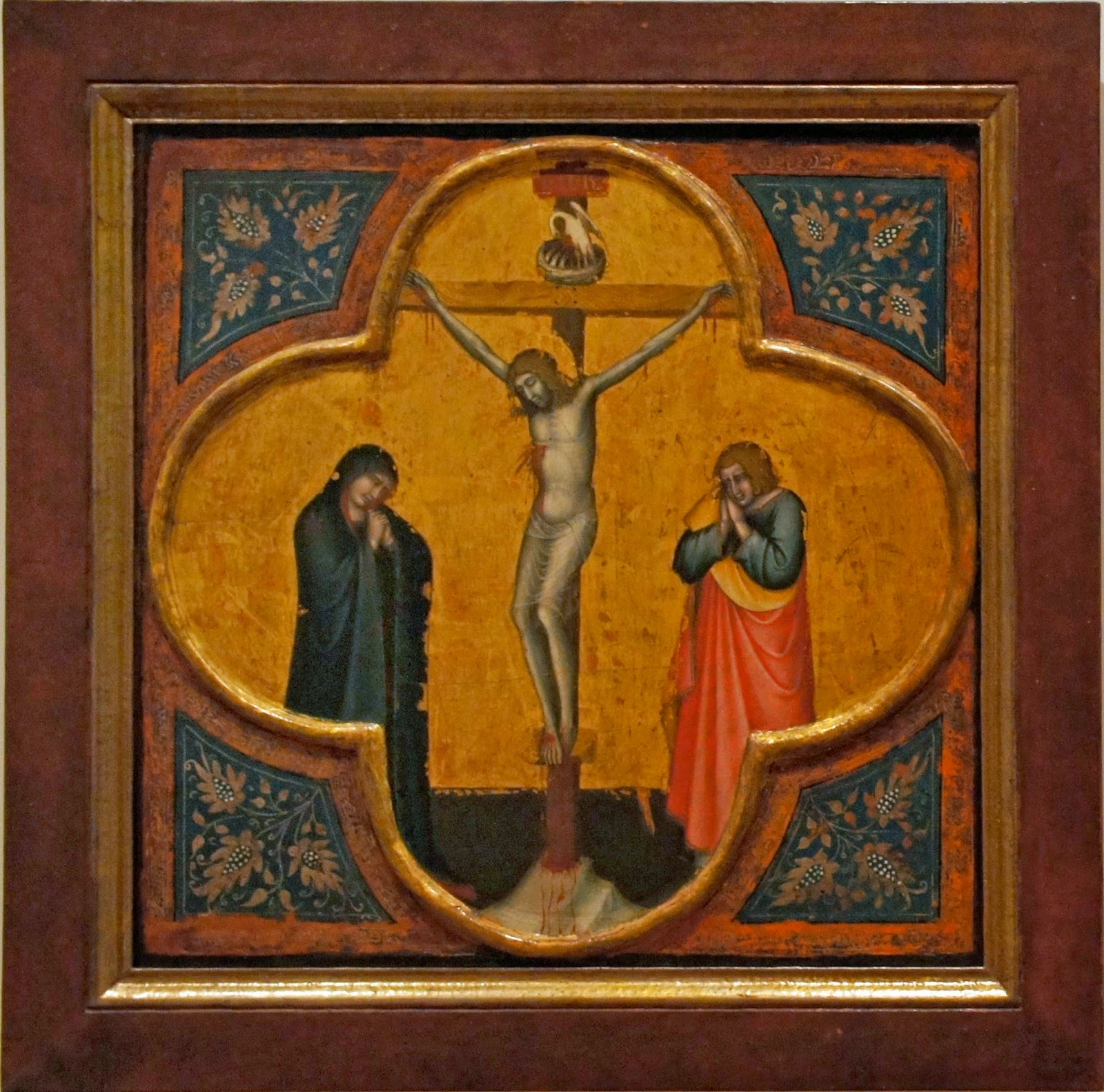 |
| Painting by Gerard David - Courtesy of Wikipedia |
Sing My Tongue of Warfare Ended is a translation by
Monsignor Ronald A. Knox (1888 - 1957) of the opening 5 verses (+ doxology) of the 6th century Latin hymn:
Pange Lingua Gloriosi Proelium Certaminis by
Venantius Fortunatus (c.530-c.600/609). As poet of the
Merovingian Court, he composed the hymn for the procession that brought a relic of the
True Cross to
Queen Radegund in 570. In the Mass, this hymn has been traditionally chanted during the Adoration of the Cross on Good Friday. In the Roman Breviary it has been divided into shorter hymns (eg.
Crux Fidelis - see 2nd video) which are used during Holy Week. It is believed that Fortunatus' work inspired
St. Thomas Aquinas to write his great hymn for the Feast of Corpus Christi:
Pange Lingua Gloriosi Corporis Mysterium. In the Divine Office (1974), Fr. Knox's translation:
Sing My Tongue of Warfare Ended is sung on Good Friday with the Office of Readings. The Divine Office recommends the tune:
Mannheim by
Friedrich Filitz (1804-1876). An alternative tune that can also be used is
Picardy, as featured in the following video.
Alternative Tune: Picardy
PANGE, LINGUA, GLORIOSI PROELIUM CERTAMINIS
1. Pange, lingua, gloriosi
proelium certaminis,
et super Crucis trophaeo
dic triumphum nobilem,
qualiter Redemptor orbis
immolatus vicerit.
2. De parentis protoplasti
fraude Factor condolens,
quando pomi noxialis
morte morsu corruit,
ipse lignum tunc notavit,
damna ligni ut solveret.
3. Hoc opus nostrae salutis
ordo depoposcerat,
multiformis proditoris
ars ut artem falleret,
et medelam ferret inde,
hostis unde laeserat.
4. Quando venit ergo sacri
plenitudo temporis,
missus est ab arce Patris
natus, orbis, Conditor,
atque ventre virginali
carne factus prodiit.
5. Vagit infans inter arcta
conditus praesepia:
membra pannis involuta
Virgo Mater alligat:
et manus pedesque et crura
stricta cingit fascia.
6. Lustra sex qui iam peracta
tempus implens corporis,
se volente, natus ad hoc,
passioni deditus,
Agnus in crucis levatur
immolandus stipite.
7. En acetum, fel, arundo,
sputa, clavi, lancea:
mite corpus perforatur,
Sanguis, unda profluit
terra, pontus, astra, mundis,
quo lavantur flumine!
8. Crux fidelis,
inter omnes
arbor una nobilis;
nulla talem silva profert,
flore, fronde, germine.
Dulce lignum, dulci clavo,
dulce pondus sustinens!
9. Flecte ramos, arbor alta,
tensa laxa viscera,
et rigor lentescat ille,
quem dedit nativas,
ut superni membra Regis
miti tendas stipite.
10. Sola digna tu fuisti
ferre saeculi pretium,
atque portum praeparare
nauta mundo naufrago,
quem sacer cruor perunxit,
fusus Agni corpore.
11. Aequa Patri Filioque,
inclito Paraclito,
sempiterna sit beatae
Trinitati gloria,
cuius alma nos redemit
atque servat gratia. Amen.
Crux Fidelis (Drawn from verses: 8, 1-3, 11 above)
CRUX FIDELIS
1. Crux fidelis,
inter omnes
arbor una nobilis;
nulla talem silva profert,
flore, fronde, germine.
Dulce lignum, dulci clavo,
dulce pondus sustinens!
2. Pange, lingua, gloriosi
proelium certaminis,
et super Crucis trophaeo
dic triumphum nobilem,
qualiter Redemptor orbis
immolatus vicerit.
3. De parentis protoplasti
fraude Factor condolens,
quando pomi noxialis
morte morsu corruit,
ipse lignum tunc notavit,
damna ligni ut solveret.
4. Hoc opus nostrae salutis
ordo depoposcerat,
multiformis proditoris
ars ut artem falleret,
et medelam ferret inde,
hostis unde laeserat.
4. Quando venit ergo sacri
plenitudo temporis,
missus est ab arce Patris
natus, orbis, Conditor,
atque ventre virginali
carne factus prodiit.
5. Aequa Patri Filioque,
inclito Paraclito,
sempiterna sit beatae
Trinitati gloria,
cuius alma nos redemit
atque servat gratia. Amen.

_(6710508923).jpg)

